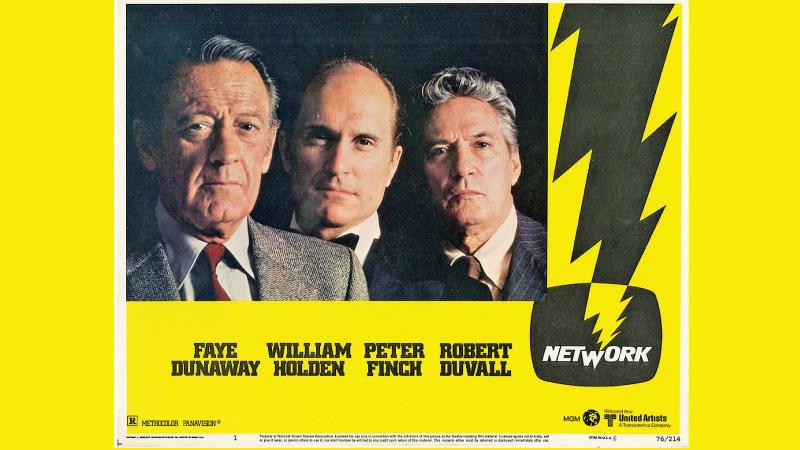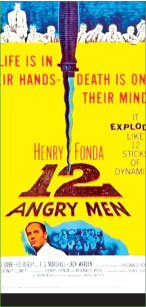
An observation of three films by American Filmmaker Sidney Lumet and their themes of power and tyranny of an established system - 12 Angry Men (1957) Dog Day Afternoon (1975) and Network (1976)
Sidney Lumet is at times overlooked in the echelons of great American filmmakers that came to prominence during the American New Wave of Cinema. Although not belonging to the new wave style that propelled the likes of Steven Spielberg, George Lucas and Brian De Palma to stardom, Lumet held his own. He was called a ‘People’s Director’ for his understanding of the importance of collaboration between his craft and his characters. His films were humane and multi layered. The Chicago Times film critic Roger Ebert called of him as “one of the finest craftsmen and warmest humanitarians among all film directors.” Much like the ethos in his work, his films explored how the common man struggles with the established systems of class, capitalism, bureaucracy, and law. They are as relevant today as they were to the periods of their release.
The significance a title gives a film is something that is sometimes overlooked in understanding a film’s language and context. Of the three to be discussed in this piece, 1976’s Network is possibly the most bold, radical and prophetic. The premise where a news network exploits a suicidal man’s rants for better ratings sounds like far fetched farce. Yet, at the core of the film lies the idea of the power media wields over the masses in its ability to condition its viewers the way it wishes. Network is a story of the decline of an age of honesty, hard work and humility. An age that gives way to ambition and exploitation - a dynamic played through the characters played by William Holding and Faye Dunaway respectively. Network is not a film centred on fake news propagation - that would be an ignorant assessment on a film discussing a larger plot at play. It is a film about open lies and hidden truths - of the necessity for a people to be entertained, a media to entertain and a hierarchy that exploits. A triangle that erodes the values of society. A network.
Heist Films often have a clear cut idea of whom the viewer roots for. That is in essence what carries the action, thrills and high stakes throughout the film - a rooted understanding of the motive beneath. Those like The Town (2009) or Heat (1995) are excellent examples of well paced and ambitious Heist films. Yet Lumet’s Dog Day Afternoon comes off much like a social experiment where action revolves around an erratic Al Pacino pacing up and down in a small bank in New York while trash talking law enforcement. Unlike Network which is more direct in its critique of an establishment, Dog Day plays with its audience’s perception as the story unfolds. For most of the story, the crowd that gather at the besieged bank cheer on Sonny as he confronts the authorities, while his hostages maintain an element of comfort and trust in his nature. When his nature is revealed to be that of a homosexual, cheers turn to jeers. His fellow bank robber Sal (Played by the late John Cazale) shrinks further into despair at his predicament, as the storyline draws to a close in an anticlimactic ending. A society’s trust in an authority is the mould that prevents anarchy and the prevalence of law and order. Throughout Dog Day, the pendulum swings in favour of and then against Sonny - who as mentioned previously, is a victim; of not just the system - but of his family, society, and even himself. The actions of his past and present are judged and laid before him in his confrontation with the state - represented by the police who are detested by the general community. Yet, as all draws to a close, Sonny, his hostages and all else resign to the same state we first found them in. In the mercy of the higher power will continue to exert its ways and wills.
From the power of authority to the power of the regular citizen. 12 Angry Men is possibly Lumets most widely seen film. One that has placed itself not just as a riveting chamber drama, but also as a piece that observes the process of justice and the correct identification of evidence in a case along with the power of an individual to elicit change. Unlike the previous two films discussed, 12 Angry Men is from the viewpoint of the regular citizen wielding the power they have through the means of a jury.
As proceedings for the debate over the verdict begin, all but one are convinced of their stance. The defendant - a 19 year old boy is guilty! As the film draws to a close there seems to be the common consensus that there is room for reasonable doubt to acquit him. A Master class in acting and direction; Lumet directs an ensemble cast led by Henry Fonda who plays Juror 8 in an almost true to life depiction of events as they happen.
12 Angry Men starts off with a belief that is constantly fed and reinforced to the audience. As the evidence is laid bare; all evidence seems to point in the direction of a prosecution.
As the jury gathers to affirm this rather than debate their agreement on everything seems to be more or less clear. The boy is guilty. Is this the matter with simply the prejudice and possibly racially insensitive jurors (it is implied that there is an immigrant, and ‘looks ethnic) or is it the basis of a justice system that aims to indicts rather than investigate? It is here that the power of the individual shines through.
Despite being films that were catered to a different time and possibly even a different society, Sidney Lumet and his films remain timeless due to their admittedly prophetic nature and their realistic depiction of the ever present conflict between the establishment and the individual. Often times almost Orwellian in nature, his films are more than engaging in times where rumour is widespread, paranoia rampant, news in full flow and societies which are more and more suspicious of an established rhetoric. A reassessment if not a discovery of Lumet’s filmography may prove more than just relevant.
